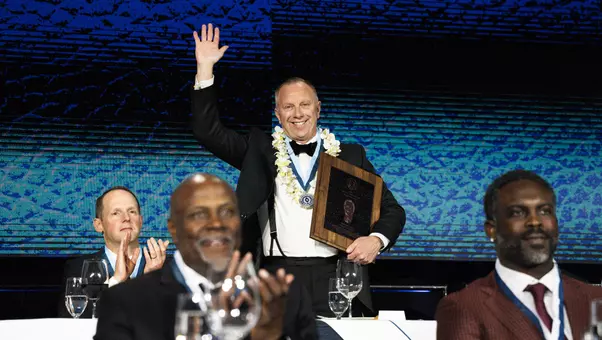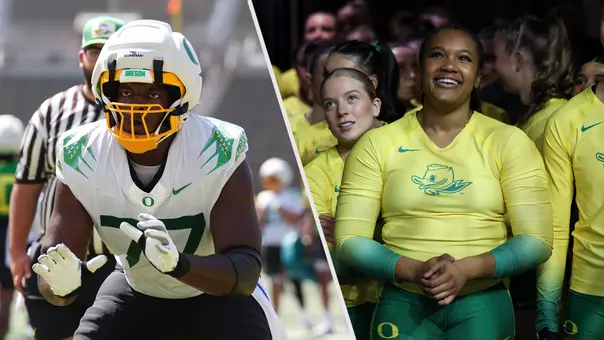
UO Responds to NCAA Committee Findings
12/05/18 | General
The NCAA on Wednesday delivered to the public resolution in the case involving four UO programs.
The NCAA Committee on Infractions has issued its findings to the University of Oregon regarding alleged rules violations in the UO's track and field and men's and women's basketball programs. It is the final step in the enforcement process and comes almost one year after the university received the notice of allegations. Throughout the process, the UO cooperated fully with the NCAA.
The NCAA press release is available online.
While the university respects the hearings panel's findings and associated sanctions, the UO disagrees with its conclusions. The institution believes there was no academic misconduct in the UO's track and field program and that the decision of the hearings panel is unreasonable and inconsistent with conclusions reached by the NCAA in similar situations. For that reason, the university is evaluating the sanctions relative to this finding. The institution has 15 days to decide whether to file an appeal.
While the university acknowledges rule violations in its men's and women's basketball programs, these violations do not rise to the level of a finding that UO head coaches failed to promote an atmosphere of compliance under NCAA bylaws and these conclusions. The UO is inclined to abide by the findings and sanctions outlined by the NCAA in the two basketball cases but intends to further evaluate the NCAA rulings before making a final decision regarding appeal.
"The University of Oregon's athletic program is committed to integrity, the highest ethical standards and compliance with NCAA bylaws," said UO Athletic Director Rob Mullens. "In all of these cases, our compliance monitoring program identified the issues and they were self-reported to the NCAA. As we noted several months ago, we have addressed the matters with the responsible employees and enhanced compliance training within the department. These cases do not merit the level of charges or sanctions issued by the NCAA."
The university has already taken measures to address these technical violations and to ensure that they will not be repeated in the future. All involved personnel have been disciplined and compliance education has been enhanced for all staff and coaches.
In its report, the committee did cite the UO's prompt self-detection and disclosure, established history of self-reporting secondary violations, acceptance of responsibility and imposition of meaningful corrective measures, the time and resources devoted by the UO in self-detection, as well as the "diligent monitoring" and "prompt and thorough handling" on the part of the institution and the faculty athletics representative.
The hearings panel also said men's head basketball coach Dana Altman has created a culture of compliance and lauded women's head basketball coach Kelly Graves for his candor and acceptance of responsibility.
A summary of the charges includes:
Track and field — The hearings panel determined that academic misconduct occurred in a case involving a former track and field student-athlete and a faculty member. The faculty member changed a grade from failing to passing for the student-athlete, contingent on that student completing coursework at a later date. The university's faculty athletics representative discovered the grade change, the university determined it was a violation of the UO's grading policy, the student was immediately removed from competition, and the potential violation was reported to the NCAA. In this case, the university's internal controls worked and there was a finding by the university's senior vice provost that no academic misconduct had occurred. Over the past 10 months, the institution has been working unsuccessfully through the NCAA appeals process to defend its institutional right to determine what constitutes academic misconduct.
Despite the fact that the committee's penalty is imposed on the entire track and field program, it is important to point out the committee found the instance of academic misconduct was related to a single grade change by an adjunct faculty member "without the knowledge of any athletic staff members." In weighing whether to appeal the proposed penalty, the question is whether it is fair and appropriate to punish the entire team for an isolated incident involving one student and a faculty member, who has acknowledged the mistake was in no way related to the student's status as an athlete.
The Committee on Infractions also noted that the case within the UO's track and field program "was a far cry from the more extensive and orchestrated academic fraud schemes the COI has designated as Level I in past cases" and seemed to point out lack of clear guidance on these issues. In fact, the committee stated that the NCAA enforcement staff's interpretation of academic misconduct in this case "may also warrant review by the membership."
Men's basketball — The Committee on Infractions found that men's head basketball coach Dana Altman promotes an atmosphere of compliance. The hearings panel did claim there was a failure to properly monitor the program after noncoaching staff members conducted prohibited workouts with a handful of student-athletes and improperly participated in on-court activities. While the UO acknowledges the impermissible workout violation — one of the noncoaching staff members was suspended — and while no penalties were assessed against Altman, the charge of head coach responsibility is simply not warranted in this case. The UO believes such a charge was intended for coaches who do not demonstrate a strong commitment to compliance and ethical stands, and this instance falls considerably short of the legislative intent and case precedent. The violation should have been charged as an impermissible coaching activities infraction.
Women's basketball — The Committee on Infractions also determined that women's head basketball coach Kelly Graves failed to properly promote an atmosphere of compliance under the head coach responsibility bylaw. The charge stems from members of the strength and conditioning staff participating in on-court drills and assisting in voluntary workouts outside the presence of the coaching staff. The charge of head coach responsibility is, again, not warranted and falls short of the legislation's intent and previous case precedent. The violation also should have been charged as an impermissible coaching activities infraction, and, again, we are evaluating how to best move forward with respect to a potential appeal.
In an unrelated matter, in fall 2016, as a result of a misinterpretation by the UO compliance staff in advising then-football staff members, the UO football program improperly used an electronic reader board in the Casanova Center for recruiting purposes. The UO did not contest the charge and there were no penalties prescribed by the NCAA.
The NCAA press release is available online.
While the university respects the hearings panel's findings and associated sanctions, the UO disagrees with its conclusions. The institution believes there was no academic misconduct in the UO's track and field program and that the decision of the hearings panel is unreasonable and inconsistent with conclusions reached by the NCAA in similar situations. For that reason, the university is evaluating the sanctions relative to this finding. The institution has 15 days to decide whether to file an appeal.
While the university acknowledges rule violations in its men's and women's basketball programs, these violations do not rise to the level of a finding that UO head coaches failed to promote an atmosphere of compliance under NCAA bylaws and these conclusions. The UO is inclined to abide by the findings and sanctions outlined by the NCAA in the two basketball cases but intends to further evaluate the NCAA rulings before making a final decision regarding appeal.
"The University of Oregon's athletic program is committed to integrity, the highest ethical standards and compliance with NCAA bylaws," said UO Athletic Director Rob Mullens. "In all of these cases, our compliance monitoring program identified the issues and they were self-reported to the NCAA. As we noted several months ago, we have addressed the matters with the responsible employees and enhanced compliance training within the department. These cases do not merit the level of charges or sanctions issued by the NCAA."
The university has already taken measures to address these technical violations and to ensure that they will not be repeated in the future. All involved personnel have been disciplined and compliance education has been enhanced for all staff and coaches.
In its report, the committee did cite the UO's prompt self-detection and disclosure, established history of self-reporting secondary violations, acceptance of responsibility and imposition of meaningful corrective measures, the time and resources devoted by the UO in self-detection, as well as the "diligent monitoring" and "prompt and thorough handling" on the part of the institution and the faculty athletics representative.
The hearings panel also said men's head basketball coach Dana Altman has created a culture of compliance and lauded women's head basketball coach Kelly Graves for his candor and acceptance of responsibility.
A summary of the charges includes:
Track and field — The hearings panel determined that academic misconduct occurred in a case involving a former track and field student-athlete and a faculty member. The faculty member changed a grade from failing to passing for the student-athlete, contingent on that student completing coursework at a later date. The university's faculty athletics representative discovered the grade change, the university determined it was a violation of the UO's grading policy, the student was immediately removed from competition, and the potential violation was reported to the NCAA. In this case, the university's internal controls worked and there was a finding by the university's senior vice provost that no academic misconduct had occurred. Over the past 10 months, the institution has been working unsuccessfully through the NCAA appeals process to defend its institutional right to determine what constitutes academic misconduct.
Despite the fact that the committee's penalty is imposed on the entire track and field program, it is important to point out the committee found the instance of academic misconduct was related to a single grade change by an adjunct faculty member "without the knowledge of any athletic staff members." In weighing whether to appeal the proposed penalty, the question is whether it is fair and appropriate to punish the entire team for an isolated incident involving one student and a faculty member, who has acknowledged the mistake was in no way related to the student's status as an athlete.
The Committee on Infractions also noted that the case within the UO's track and field program "was a far cry from the more extensive and orchestrated academic fraud schemes the COI has designated as Level I in past cases" and seemed to point out lack of clear guidance on these issues. In fact, the committee stated that the NCAA enforcement staff's interpretation of academic misconduct in this case "may also warrant review by the membership."
Men's basketball — The Committee on Infractions found that men's head basketball coach Dana Altman promotes an atmosphere of compliance. The hearings panel did claim there was a failure to properly monitor the program after noncoaching staff members conducted prohibited workouts with a handful of student-athletes and improperly participated in on-court activities. While the UO acknowledges the impermissible workout violation — one of the noncoaching staff members was suspended — and while no penalties were assessed against Altman, the charge of head coach responsibility is simply not warranted in this case. The UO believes such a charge was intended for coaches who do not demonstrate a strong commitment to compliance and ethical stands, and this instance falls considerably short of the legislative intent and case precedent. The violation should have been charged as an impermissible coaching activities infraction.
Women's basketball — The Committee on Infractions also determined that women's head basketball coach Kelly Graves failed to properly promote an atmosphere of compliance under the head coach responsibility bylaw. The charge stems from members of the strength and conditioning staff participating in on-court drills and assisting in voluntary workouts outside the presence of the coaching staff. The charge of head coach responsibility is, again, not warranted and falls short of the legislation's intent and previous case precedent. The violation also should have been charged as an impermissible coaching activities infraction, and, again, we are evaluating how to best move forward with respect to a potential appeal.
In an unrelated matter, in fall 2016, as a result of a misinterpretation by the UO compliance staff in advising then-football staff members, the UO football program improperly used an electronic reader board in the Casanova Center for recruiting purposes. The UO did not contest the charge and there were no penalties prescribed by the NCAA.
Duck Insider 2-26-26
Thursday, February 26
Duck Insider 2-25-26
Thursday, February 26
Nate Bittle | Postgame vs. Wisconsin
Thursday, February 26
Elon Butler | Oregon Classic Preview
Wednesday, February 25













